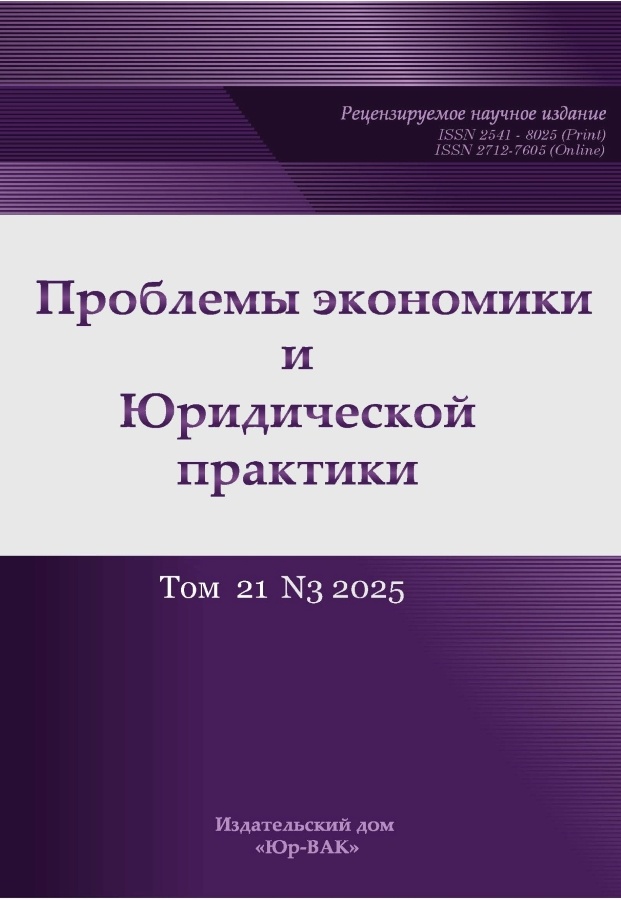Legal Instruments to Support Digital Trade Procedures and Mutual Recognition by States of Electronic Documents in the Field of Cross-Border Trade
- Authors: Solovyanenko N.I.1
-
Affiliations:
- Institute of State and Law of the Russian Academy of Sciences
- Issue: Vol 21, No 3 (2025)
- Pages: 98-104
- Section: Private Law (Civil) Sciences
- URL: https://journals.eco-vector.com/2541-8025/article/view/688010
- DOI: https://doi.org/10.33693/2541-8025-2025-21-3-98-104
- EDN: https://elibrary.ru/VBBFFE
- ID: 688010
Cite item
Abstract
The purpose of the study. The article examines the legal structures of the use of innovative digital technologies in trading activities from the perspective of promoting Russia's interests as one of the key participants in global trade and creating a favorable regulatory environment for it. The purpose of the study is to identify legal instruments to support e-commerce at the national, regional and global levels and to identify, with a view to eliminating or minimizing factors that hinder cross-border trade interaction in digital format. The provisions of the «Framework Agreement on Facilitation of Cross-border Paperless Trade in Asia and the Pacific» are analyzed, first of all, the parties agree on an «essentially equivalent level of reliability. Initiatives aimed at mutual recognition of documents such as certificates of origin, phytosanitary certificates, commercial invoices, and bills of lading are being considered. Conclusions. Russia's participation in the development of legal instruments to support electronic commerce meets the interests of Russia as one of the key participants in global high-tech trade. Legal instruments to support digital procedures for national and cross-border trade are aimed at providing its participants with the opportunity to perform legal actions in the digital environment in predictable, clear and stable legal conditions. A promising legal instrument is the «Framework Agreement on Facilitation of Cross-border Paperless Trade in Asia and the Pacific», focused on the latest technological models of digital cross-border document management and mutual recognition by states of trade electronic documents. The mechanism for ensuring an «essentially equivalent level of reliability» includes, according to Russia's position, the responsibility of subjects of electronic document management. Initiatives aimed at mutual recognition of documents such as certificates of origin, phytosanitary certificates, commercial invoices and bills of lading indicate the implementation of the legal framework of paperless cross-border trade. The Framework Agreement does not affect the rights and obligations of the parties under existing agreements or international conventions, which meets the legal framework of the cross-border trust area in the EAEU.
Full Text
About the authors
Nina I. Solovyanenko
Institute of State and Law of the Russian Academy of Sciences
Author for correspondence.
Email: nina.coshkina@yandex.ru
ORCID iD: 0000-0001-5551-3119
SPIN-code: 3232-4877
Scopus Author ID: 57253220900
Cand. Sci. (Law), Senior Researcher of the Procedural Law Sector
Russian Federation, MoscowReferences
- Borisova L.V. On the concept of artificial intelligence and the legal regime of works created by it without human creative participation//Actual problems of Russian law. 2024. Vol. 19. No. 8 (165). pp. 100–113.
- Gabov A.V., Tonkov E.E., Markheim M.V., Novikova A.E., Dizer O.A. The moral imperatives of Russian statehood: personal dignity, sovereignty, solidarity (review of reports of scientific and practical conferences and round tables within the framework of the first Belgorod Legal Forum) //Proceedings of the Institute of State and Law of the Russian Academy of Sciences. 2024. Vol. 19. No. 6. pp. 38–70.
- Lizikova M.S. Ethical and legal issues of artificial intelligence development//Proceedings of the Institute of State and Law of the Russian Academy of Sciences. 2022. Vol. 17. No. 1. pp. 177–194.
- Solovyanenko N.I. Cross-border paperless trade at the present stage: development of favorable legal conditions and procedures for Russia//State and law. 2024. No. 5. pp. 114–123.
- Lisitsa V.N. Smart contract as a contract providing for automated execution using information technology// In the collection: Law and legality: issues of theory and practice. Collection of materials of the XI All-Russian Scientific and practical Conference. Abakan, 2021. pp. 26–27.
- Lisitsyn-Svetlanov A.G. Factors influencing the appearance of «white spots» in modern international law//Proceedings of the Institute of State and Law of the Russian Academy of Sciences. 2016. No. 4. pp. 5–13.
- Solovyanenko N.I. The mechanism of justice as a factor of reliability and trust in subjects of economic relations in an innovative digital environment//Law and practice. 2025. No. 1. pp. 192–197.
- Chereshneva I.A. Digital platforms: from competition protection to data protection//Competition law. 2023. No. 2. pp. 23–26.
- John Gregory (2024). «Legal Implementation Guide for Cross-border Paperless Trade», UNNExT Working Paper Series No. 12, October 2024, Bangkok, ESCAP. https://unnext.unescap.org.
- Tengfei Wang (2025). «Adopting Electronic Bill of Lading: Successes, Challenges and Critical Questions», UNNExT Working Paper Series No. 1, May 2025, Bangkok, ESCAP. https://unnext.unescap.org/.
Supplementary files









